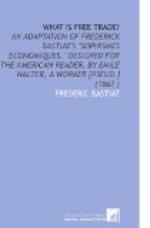I have said more than once, that I am opposing only the theory of the protectionists, with the hope of discovering the source of their errors. Were I disposed to enter into controversy with them, I would say: Why direct your tariffs principally against England, a country more overloaded with taxes than any in the world? Have I not a right to look upon your argument as a mere pretext? But I am not of the number of those who believe that prohibitionists are guided by interest, and not by conviction. The doctrine of Protection is too popular not to be sincere. If the majority could believe in freedom, we would be free. Without doubt it is individual interest which weighs us down with tariffs; but it acts upon conviction. “The will (said Pascal) is one of the principal organs of belief.” But belief does not the less exist because it is rooted in the will and in the secret inspirations of egotism.
We will return to the Sophism drawn from internal taxes.
The government may make either a good or a bad use of taxes; it makes a good use of them when it renders to the public services equivalent to the value received from them; it makes a bad use of them when it expends this value, giving nothing in return. To say in the first case that they place the country which pays them in more disadvantageous conditions for production, than the country which is free from them, is a Sophism. We pay, it is true, so many millions for the administration of justice, and the maintenance of order, but we have justice and order; we have the security which they give, the time which they save for us; and it is most probable that production is neither more easy nor more active among nations, where (if there be such) each individual takes the administration of justice into his own hands. We pay, I grant, many millions for roads, bridges, ports, steamships; but we have these steamships, these ports, bridges, and roads; and unless we maintain that it is a losing business to establish them, we cannot say that they place us in a position inferior to that of nations who have, it is true, no budget of public works, but who likewise have no public works. And here we see why (even while we accuse taxes of being a cause of industrial inferiority) we direct our tariffs precisely against those nations which are the most taxed. It is because these taxes, well used, far from injuring, have ameliorated the conditions of production to these nations. Thus we again arrive at the conclusion that the protectionist Sophisms not only wander from, but are the contrary—the very antithesis—of truth.
As to unproductive taxes, suppress them if you can; but surely it is a most singular idea to suppose, that their evil effect is to be neutralized by the addition of individual taxes to public taxes. Many thanks for the compensation! The State, you say, has taxed us too much; surely this is no reason that we should tax each other!
A protective duty is a tax directed against foreign produce, but which returns, let us keep in mind, upon the national consumer. Is it not then a singular argument to say to him, “Because the taxes are heavy, we will raise prices higher for you; and because the State takes a part of your revenue, we will give another portion of it to benefit a monopoly?”




